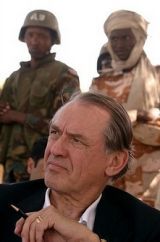UN envoy briefs Security Council on Darfur peace talks
March 6, 2007 (UNITED NATIONS) — UN special envoy Jan Eliasson said Tuesday that both Sudan’s government and rebels concede that “there is no military solution” to the grinding conflict in Darfur.

He warned however of growing tribal warring in Darfur separate from government troop activities, and called for greater efforts to improve the humanitarian plight of Darfurians.
“We expect results from the parties,” he warned following the briefing, which came as the world body awaited word from Sudan on prospects for a joint African Union-UN force in the war-torn region.
In February Eliasson and Salim travelled to Khartoum where they met with Sudanese President Omar al-Beshir and Darfur rebel commanders in a bid to re-energize the flagging Darfur peace deal.
Khartoum signed the peace accord last May with one Darfur rebel faction, but other factions declined to sign on to the deal and the conflict has raged on, and even intensified according to humanitarian aid groups.
“Our focus was on the political aspect”, Eliasson, a former Swedish foreign minister, said while insisting that the United Nations was pressing in parallel for a UN peacekeeping presence.
Eliasson welcomed the fact that Sudanese government forces have stopped aerial bombings of rebel positions in Darfur since February 11 in response to a UN request.
He however highlighted “the growing problem of tribal warfare” in Darfur, which he said has nothing to do with the Khartoum government.
France’s UN Ambassador Jean-Marc de La Sabliere meanwhile expressed disappointment that Beshir had not yet replied to a letter from UN chief Ban Ki-moon on a proposed joint UN-AU peacekeeping operation in Darfur.
“I am disappointed that we have not yet received the letter… We have been told for days that this letter was about to come,” he noted. “If it does not come, then we’ll have to see what to do and there are some delegations on the council thinking about taking measures (sanctions).”
Sudan’s UN envoy Abdalmahmood Mohamad meanwhile indicated that the letter was on its way but “will not contain anything new.”
British Ambassador Emyr Jones-Parry also expressed exasperation at what several council members view as Khartoum’s foot-dragging and also warned that the council might have to take tougher action if Beshir does not respond quickly to Ban’s letter.
“Security for the people is essential, humanitarian access is crucial,” he noted.
In his letter sent in January, Ban sought Khartoum’s permission for the dispatch of over 2,300 UN troops to lay the groundwork for a robust joint AU-UN force to take over peacekeeping in Darfur from cash-strapped and ill-equipped AU troops.
Last July, the Security Council passed a resolution calling for the deployment of 20,000 UN peacekeepers to halt the violence in Darfur.
Beshir steadfastly rejected any large-scale UN troop deployment there, but later endorsed a three-phase plan agreed at high-level November meetings in Ethiopia and Nigeria for the deployment of a “hybrid” AU-UN peacekeeping force.
The Sudanese leader has made it clear that any peacekeeping force in Darfur must remain under the aegis of the AU and that the UN would be confined to a “technical and logistics role.”
Last month International Criminal Court prosecutor Luis Moreno-Ocampo in The Hague accused Sudan’s secretary of state for humanitarian affairs Ahmed Haroun and Janjaweed leader Ali Kosheib of having “jointly committed crimes against the civilian population of Darfur.”
Moreno-Ocampo accused Haroun and Kosheib of 51 crimes against humanity and war crimes — including murder, torture and mass rape.
The war in Darfur erupted in February 2003 when rebels from minority tribes in the vast western province took up arms to demand an equal share of national resources, prompting a heavy-handed crackdown from Sudanese government forces and their Janjaweed proxy militia.
According to UN estimates, 200,000 people have been killed and 2.5 million displaced.
(AFP)
